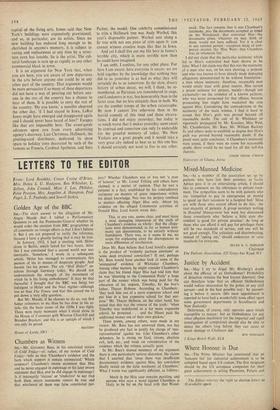Chambers as Witness
SIR,—Mr. Goronwy Rees, in his emotional review of Cold Friday—or, rather, of my review of Cold Friday—tells us that 'Chambers's evidence and the facts which support it remain unimpaired.' Which evidence? Chambevs's sworn statement that Hiss and he never engaged in espionage or his later sworn statement that Hiss and he did engage in espionage? Is it necessarily 'vicious' or 'vindictive' to say that both these sworn statements cannot be true and that whichever of them was false constituted per-
jury? Whether Chambers was or was not 'a man of honour,' as Mr. Lionel Trilling and others have claimed, is a matter of opinion. That he was a perjurer is a fact, established by his contradictory testimony on matters of grave importance within his direct knowledge. Nor was his perjury confined to matters affecting Alger Hiss only. About his evidence on the alleged Communist activities of Donald Hiss, Lord Jowitt wrote this: This, at any rate, seems clear, and must leave a most damaging impression of the truth of Chambers's evidence as whole: that the allega- tions were demonstrated, so far as human testi- mony can demonstrate, to be entirely without foundation. There was, as it seems to me, no scope for explaining away the discrepancies as mere differences of recollection.
Does Mr. Rees believe that Lord Jowitt's opinion is the product of 'violently partisan emotions' or 'some deep irrational conviction'? If not, perhaps Mr. Rees would have another look at some of the 'unimpaired' evidence of Whittaker Chambers. Among other matters, he might consider Chambers's claim that his friend Alger Hiss had told him that he was 'diverting to the Communist Party' a large part of the money which was being paid for the education of his stepson, Timothy, by the boy's father, Thayer Hobson. According to Chambers: 'they took him out of a more expensive school and put him in a less expensive school for that pur- pose.' Mr. Thayer Hobson, on the other hand, has stated that this was the reverse of the truth: 'when Timothy was transferred to a far more expensive school, he protested . . . and the Hisses paid the additional money out of their own pockets.'
These points, among others, were made in my review. Mr. Rees has not answered them, nor has he produced any fact to justify his charge of 'mis- representation' against me. Like Chambers's other defenders, he is strong on God, visions, absolute evil, hell, etc., and weak on consideration of the evidence which the witness actually gave.
In Mr. Rees's slanted summary of my argument there is one particularly serious distortion. He claims that I asserted that 'since there was insufficient documentary evidence against Hiss, his conviction finally rested on the false testimony of Chambers.' What I wrote was significantly different, as follows: Much in the Hiss case remains puzzling, and anyone who says a word against Chambers is likely to be hit on the head with that Wood-
stock. The fact remains that it was Chambers's testimony, plus the documents accepted as typed on the Woodstock, that convicted Hiss—the documents alone, whatever we may think of them, would not have sufficed. Yet it is clear to any rational person---exception made of tem- porary mystics like Miss West—that Chambers was an inveterate liar.
I did not claim that the particular testimony which led to Hiss's conviction had been shown to be false. What I did claim was that this was the testimony of a man who was, on his own showing, a perjurer and who was known to have already made damaging allegations demonstrated to be without foundation: a man whose testimony, therefore, reasonable men would surely treat with great reserve. Hiss served a prison sentence for perjury, mainly—though not exclusively—on the evidence of a known perjurer, who was never prosecuted for that offence, because prosecuting him might have weakened the case against Hiss. Considering the contradictions in the testimony of the main witness, 1 find it hard to accept that Hiss's guilt was proved beyond all reasonable doubt. The cult of St. Whittaker so vigorously propagated by Mr. Koestler, Miss West, Mr. Chamberlain, Mr. Rees, Mr. William Buckley Jr. and others seeks to establish as dogma that Hiss's guilt was proved beyond reasonable doubt. If the proof were quite conclusive, if Chambers's testimony were sound, if there were no room for reasonable doubt, there would be no need for all this hell-fire rhetoric.
.University of Ghana, Accra
CONOR CRUISE O'BRIEN

































 Previous page
Previous page